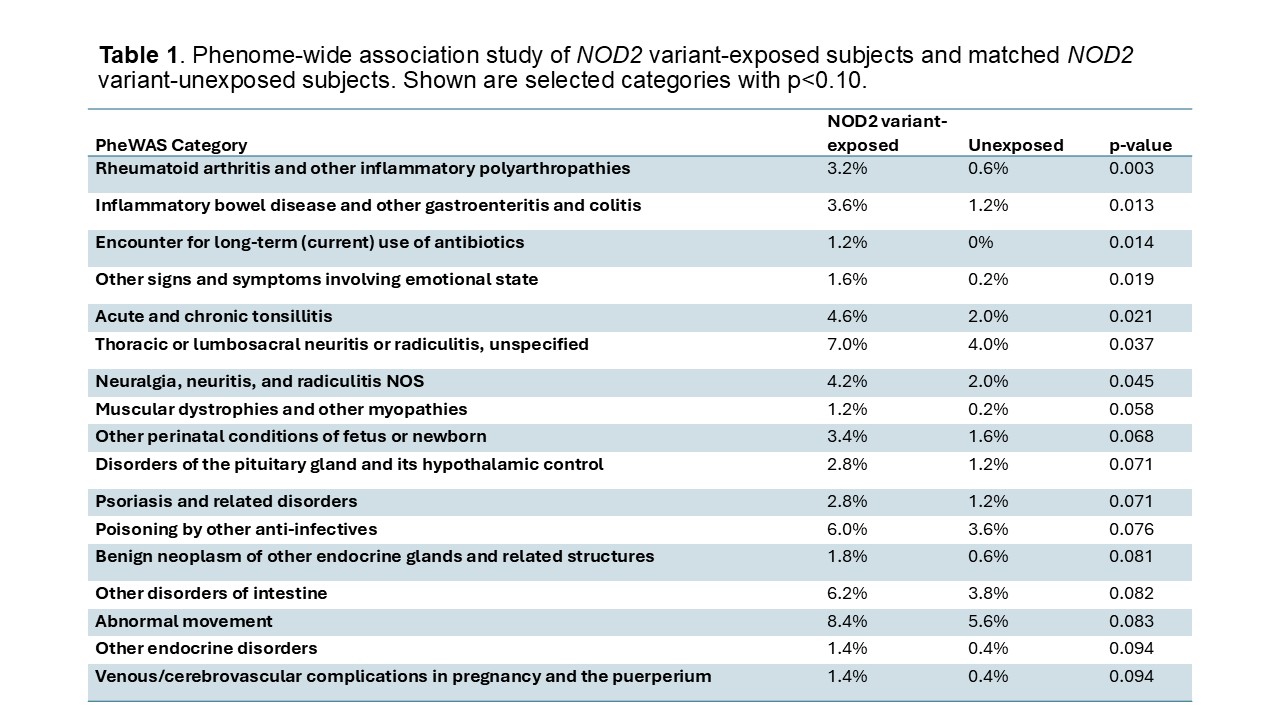Session Information
Session Type: Poster Session A
Session Time: 10:30AM-12:30PM
Background/Purpose: The nucleotide-binding oligomerization domain-containing protein 2 (NOD2) gene is associated with risk for several inflammatory diseases, including Crohn disease, Blau syndrome, and Yao syndrome (YAOS). Growing awareness of the heterogeneity of NOD2-associated conditions has exposed a knowledge gap about the spectrum of NOD2-related phenotypes. Our aim was to perform a phenome-wide association study (PheWAS) of NOD2 variants.
Methods: This study leveraged resources of a population-scale research program with available genomic sequencing data for nearly 100,000 participants recruited in the Midwest, Southeast, and Southwest United States. Participants were 18 to 50 years old, registered as patients at our institution, and had email and web access. Patients were excluded if they had a comorbidity that interfered with study participation, allogeneic bone marrow transplant, active hematological cancer, or non-U.S. residents. Twenty-seven NOD2 variants were pre-specified based on literature review. A sample of subjects carrying at least one pre-specified NOD2 variant was identified and matched to NOD2 variant-unexposed subjects by age, sex, residence, and length of medical records (i.e., >5 years). Subjects’ ICD-10 codes were pulled electronically for the prior 5 years and mapped to general PheWAS codes. For this analysis, one code appearance in five years was sufficient to count. PheWAS categories that appeared in fewer than 5 subjects were excluded. Chi-square tests were used to evaluate differences in the frequencies of PheWAS categories between NOD2 variant-exposed and unexposed subjects.
Results: The study included 500 subjects with NOD2 variants and 500 matched subjects without any NOD2 variants. The top four were c.2717+158C >T (IVS8+158), c.2782G >A (p.Val928Ile), c.2023C >T (p.Arg675Trp), and c.2938dup (p.Leu980ProfsTer2), with gnomAD allele frequencies 0.109 to 0.015 in descending order. NOD2 variant-exposed subjects had significantly higher frequencies than NOD2-unexposed subjects of twelve PheWAS categories (p< 0.05), including ‘rheumatoid arthritis and other inflammatory polyarthropathies’, ‘inflammatory bowel disease (IBD) and other gastroenteritis and colitis’, ‘treatment with long-term antibiotics’, ‘other signs and symptoms involving emotional state’, and ‘acute and chronic tonsilitis’ (Table 1). The most important variants driving the associations for arthritis-related diagnoses were c.2023C >T (p.Arg675Trp) and c.2717+158C >T (IVS8+158) while the most important variants for IBD-related diagnoses were c.2023C >T (p.Arg675Trp), c.2717+158C >T (IVS8+158), and c.2938dup (p.Leu980ProfsTer2) (Tables 2 and 3).
Conclusion: Our findings confirm and expand on previous reports that common NOD2 variants are associated with an increased risk of immune-related conditions. These include not only IBD and other forms of gastroenteritis and colitis, but also inflammatory arthritis, illnesses requiring long-term treatment with antibiotics, acute and chronic tonsilitis, and other related diagnoses. Further research is underway to illuminate autoinflammatory phenotypes causally related to NOD2 variants.
To cite this abstract in AMA style:
Davis J, Atkinson E, Kronzer V, Crowson C, Alavi A, Damianos J, Edward L, Murray J, Moyer A, Pinto e Vairo F. Immune-related Diagnoses Associated with NOD2 Variants in Human Subjects: A Phenome-wide Association Study [abstract]. Arthritis Rheumatol. 2025; 77 (suppl 9). https://acrabstracts.org/abstract/immune-related-diagnoses-associated-with-nod2-variants-in-human-subjects-a-phenome-wide-association-study/. Accessed .« Back to ACR Convergence 2025
ACR Meeting Abstracts - https://acrabstracts.org/abstract/immune-related-diagnoses-associated-with-nod2-variants-in-human-subjects-a-phenome-wide-association-study/


.jpg)
.jpg)